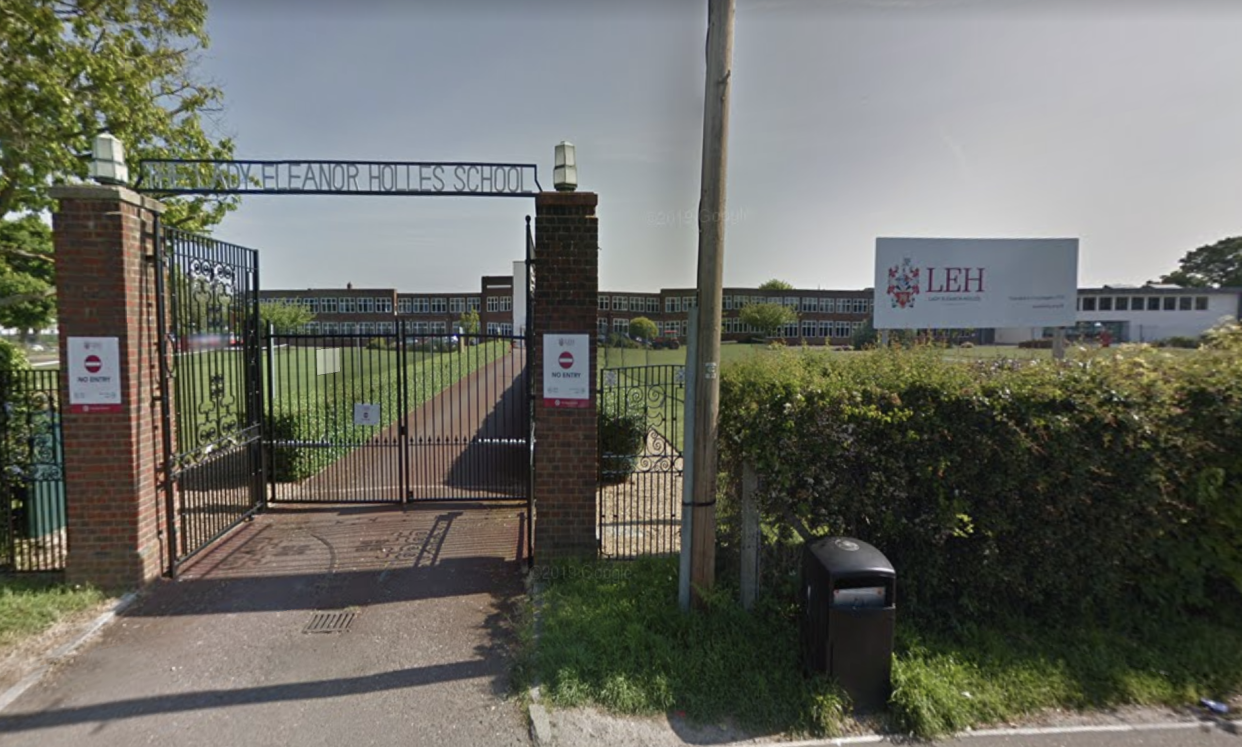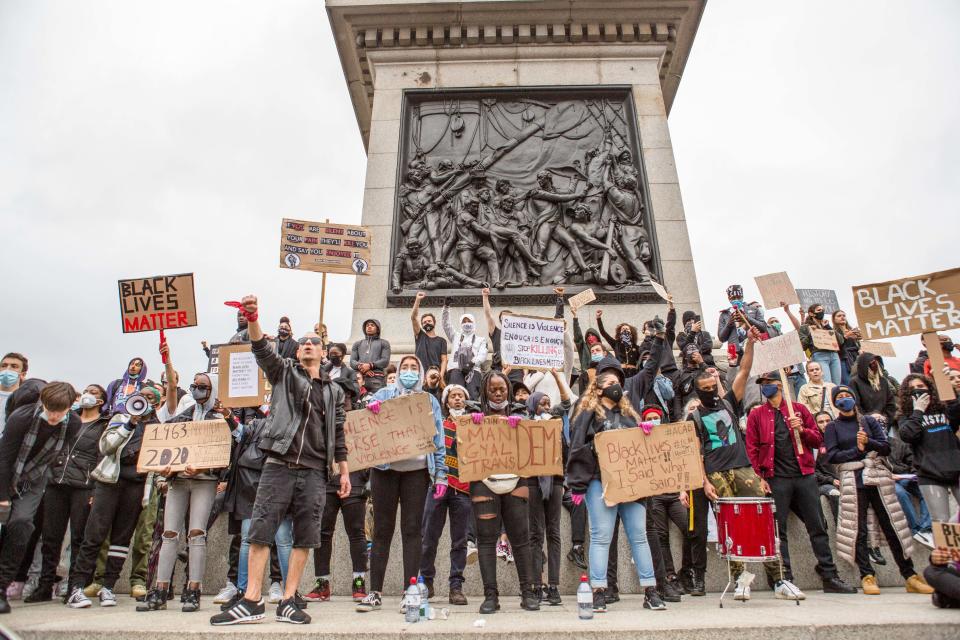Students at top independent school sign open letter calling for history lessons on white privilege

Hundreds of current and former students at a leading independent girls’ school in London have signed an open letter to their headteacher calling for the history of racism and white privilege to be taught on the curriculum.
More than 500 parents, students and alumnae of Lady Eleanor Holles (LEH), in Hampton, south-west London, signed the letter amid continuing Black Lives Matter protests over the killing of George Floyd in the US.
The letter describes LEH, which charges £6,934 per term for secondary students, as “a very privileged independent secondary school”, and calls on the headteacher and governors to improve teaching of “Black British History, white privilege and systemic racism”.
The pupils say the current teaching of these topics is “severely lacking”.
“Children and young adults should be provided with education on conscious anti-racism and thus, educated on oppression, white privilege and systemic racism,” the letter states.
“As an independent school, you have the power to decide your curriculum in years not designated to national exams, without the barriers and time constraints associated with changing the curriculum at a national level.”

Read more: Thousands sign petition to replace Bristol statue with one of anti-racism campaigner
The letter goes on to say an increased teaching of black culture and of representation of BAME communities as a whole should be part of the wider curriculum.
”Systemic racism, its roots and white privilege must be raised in subjects which every pupil undertakes, such as PSHE, where books specifically addressing the issue can be studied, and in English, where the school could support BAME authors by including their works on the syllabus,” it says.

A spokesperson for the school, which caters to around 900 students aged between seven and 18, has confirmed receipt of the letter and said it would respond when it had a “considered comment” to make.
The students say that while the subjects of racism and civil rights movements are touched upon in the history curriculum at the school, these topics “always focus on America, giving rise to the misleading impression that racial inequality is an American problem”.
“This is not the case and is a dangerous belief, as it allows insidious, systemic racism to prevail in the UK,” it states.
Read more: George Floyd death: 14 police officers hurt as violence erupts at protest in London
A need for diversity within the school community, particularly in regards to those in a position of power as educators and role models, was also highlighted.

Pressure has been mounting on the government to make the teaching of black history mandatory for all pupils.
A campaign, led by Black Curriculum, has been collecting signatures for an open letter to be sent this week to Gavin Williamson, the education secretary.
The group states on its website: “The outcomes of young people in the UK are affected by the implicit racial bias within the curriculum. When young people are not taught their history within Britain, their sense of identity and belonging is negatively impacted and social relations, hindered.
“A 2007 report on the over-representation of young Black people in the criminal justice system demonstrated the link between these shortcomings in the curriculum as causing underachievement and disaffection.”
The group states that its aims are to provide a sense of belonging and identity to young people across the UK, teach an accessible educational black British history curriculum that raises attainment for young people, and improve social cohesion between young people in the UK.
Organisers have requested a face-to-face meeting with Williamson and want a response by Windrush Day on 22 June.
Read the full letter signed by current and former students to Lady Eleanor Holles:
Dear Mrs Hanbury and Board of Governors,
We hope this email finds you well.
We, as alumnae, current students and parents wish to contact you with regard to the teaching of Black British History. Current events throw into sharp relief the need for meaningful change, and meaningful change begins with education.
Having attended LEH, a very privileged independent secondary school, we would hope that the education we received was very well rounded, however, upon reflection we are not sure this was always the case. Independent learning since leaving the school, spurred on by increasing awareness of racial inequality, has shown that our knowledge of Black British History, white privilege and systemic racism was severely lacking. It should not be possible for a child to go through school without gaining an understanding of these critical topics. Whilst we must always strive to educate ourselves, school must be the foundation for learning.
On the 1st of June 2020, The Impact of Omission survey was launched, finding that:
86.2 % of school pupils were educated on the Tudors in-depth as part of their curriculum, whereas only 9.3% learned about the role of slavery in British Industrialisation;
72.2% learned about The Great Fire of London, whereas only 7% learned about Britain’s colonisation of Africa; and
71.5% were taught about the Battle of Hastings, whereas only 5.2% learned about the role of BAME soldiers in WWI and II.
A large part of the Black Lives Matter movement concerns educating oneself and then sharing this knowledge with the people around you. Many alumnae have been sharing anti-racism resources on social media, thus illustrating the hunger for knowledge in our alumnae. However, social media should not be the first place one gains a deeper understanding of how to be actively anti-racist. This concept should be addressed in school, as it is a key driver for meaningful change. Children and young adults should be provided with education on conscious anti-racism and thus, educated on oppression, white privilege and systemic racism.
As an independent school, you have the power to decide your curriculum in years not designated to national exams, without the barriers and time constraints associated with changing the curriculum at a national level. This gives LEH a measure of freedom when it comes to making the necessary changes to incorporate Black British History into the curriculum. Whilst Black History, racism and civil rights movements are touched upon in the history curriculum, these topics always focus on America, giving rise to the misleading impression that racial inequality is an American problem. This is not the case and is a dangerous belief, as it allows insidious, systemic racism to prevail in the UK. We urge you to exert this freedom to build a foundation of knowledge around this topic, particularly in the early years of education.
Whilst we recognise that we are not trained educators, we would suggest that this change must go beyond the history curriculum. This is not only a question of teaching of historical events, but also a question of general understanding, the recognition of black culture and of representation of BAME communities as a whole. Systemic racism, its roots and white privilege must be raised in subjects which every pupil undertakes, such as PSHE, where books specifically addressing the issue can be studied, and in English, where the school could support BAME authors by including their works on the syllabus. Whilst this letter focuses on education and the curriculum we would also like to highlight the need for diversity within the school community, particularly in regards to those in a position of power as educators and role models. Representation and diversity must be prevalent in both the curriculum and the LEH community to drive meaningful change and empower BAME students. Research at universities across the country shows that when a focus on diversity is introduced into the curriculum, BAME students feel more represented in their study environment. We believe it does a disservice to the school’s BAME students to have a curriculum which does not mirror the country’s diversity and may lead to the feeling that they are not represented.
Future alumnae could go on to enact real, positive change in the world, building on values that they learnt at LEH, if the right changes are made. The fact that the national curriculum has no real emphasis on the impacts of colonialism, imperialism, racism and white privilege is deeply distressing, and severely in need of reform, but LEH has the power to address this more swiftly than many other schools. We hope that the freedom granted to LEH as an independent school spurs you to take the necessary steps towards reversing this erasure of Britain’s troubling colonial past, and building an inclusive and equal society.
You may already be making these positive changes, and if so we would welcome hearing about them. If not, we urge you to take the necessary steps to address this global societal crisis, and we look forward to seeing the necessary changes we are sure you will strive to make.
Kind regards,
The current and former pupils and parents of LEH.

